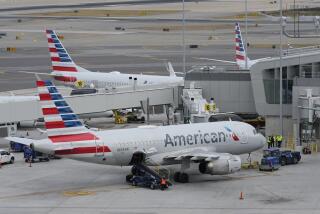Citibank is next with a new banking fee
- Share via
Another day, another new bank fee.
As the uproar swelled over Bank of America Corp.’s planned $5 monthly charge for debit card use, megabank rival Citigroup Inc. was notifying many Citibank customers that they soon would have to start paying for their checking accounts unless they maintained significantly higher balances.
Letters are going out across the country alerting Citi customers of account changes, said the bank’s retail banking chief, Stephen Troutner. In many cases, that means customers will have to maintain fatter balances to avoid fees, although Troutner said a basic account option makes dodging charges easier.
Higher fees are the new reality in retail banking, where regulations adopted in the aftermath of the bank bailouts have reduced revenue from several controversial fees by billions of dollars. At the same time, banks have seen their lending income decline due to the sluggish economy and low interest rates.
That has caused major banks to impose a variety of new customer fees, although the exact formula varies. Citibank, for example, decided not to impose “usage” fees such as the $5 a month that Bank of America, starting next year, will charge most customers who use their debit cards to purchase goods and services.
“We conducted extensive surveys with our customers, and no one wanted to pay to use debit cards,” Troutner said.
One day after announcing the new debit card fee, Bank of America was inundated with visits, calls and emails from customers.
“We are doing our best to explain the impacts, the value and convenience the debit card offers and how to avoid the fee if necessary,” spokeswoman Anne Pace said.
Short of taking out a BofA mortgage or depositing $20,000 with the Charlotte, N.C.-based bank, the way to avoid the fee is to avoid making purchases with debit cards and using them only for ATM transactions, which remain free.
Bank of America also was hit Friday with online banking problems that knocked out service on the East Coast for more than two hours and slowed it in other places, including the Los Angeles area, spokeswoman Tara Burke said.
Burke wouldn’t describe how the outage occurred but said it was not caused by hackers or related to the uproar over fees.
Cheryl Holt of Burbank said she received one of the Citibank letters this week saying her old account with the bank, a so-called Easy Checking Package that had always been free, was being replaced in December with a new account package with a $15 monthly fee or $6,000 deposit minimum.
That sent Holt, a self-employed writer with a son in college, out to move her accounts to the Burbank City Credit Union, which has free checking and free debit cards.
“Should have done it years ago!” she said.
Citi’s Troutner said customers like Holt, who had been offered a mid-level package of bank services, should opt instead for a basic checking program. It’s possible to avoid fees on that program by maintaining a combined $1,500 balance in checking and savings accounts, or by setting up a checking account with direct deposit of paychecks and at least one automated bill-payment service.
A more recently implemented mid-tier package, called the Citi Account, will carry a $20 monthly fee starting Nov. 1 unless the customer keeps a $15,000 combined balance in checking, savings and loans, up from $6,000.
In imposing the new fees, the big banks are “playing with their futures,” said banking customer-service consultant John Tschohl of the Service Quality Institute.
Tschohl pointed to Netflix, which lost nearly $10 billion in stock market value after surprising customers with a new pricing structure that added as much as 60% to the bills of people who watch both DVDs and online video.
“When you become arrogant and start acting like a monopoly,” he said, “it will come back to haunt you.”
More to Read
Inside the business of entertainment
The Wide Shot brings you news, analysis and insights on everything from streaming wars to production — and what it all means for the future.
You may occasionally receive promotional content from the Los Angeles Times.











